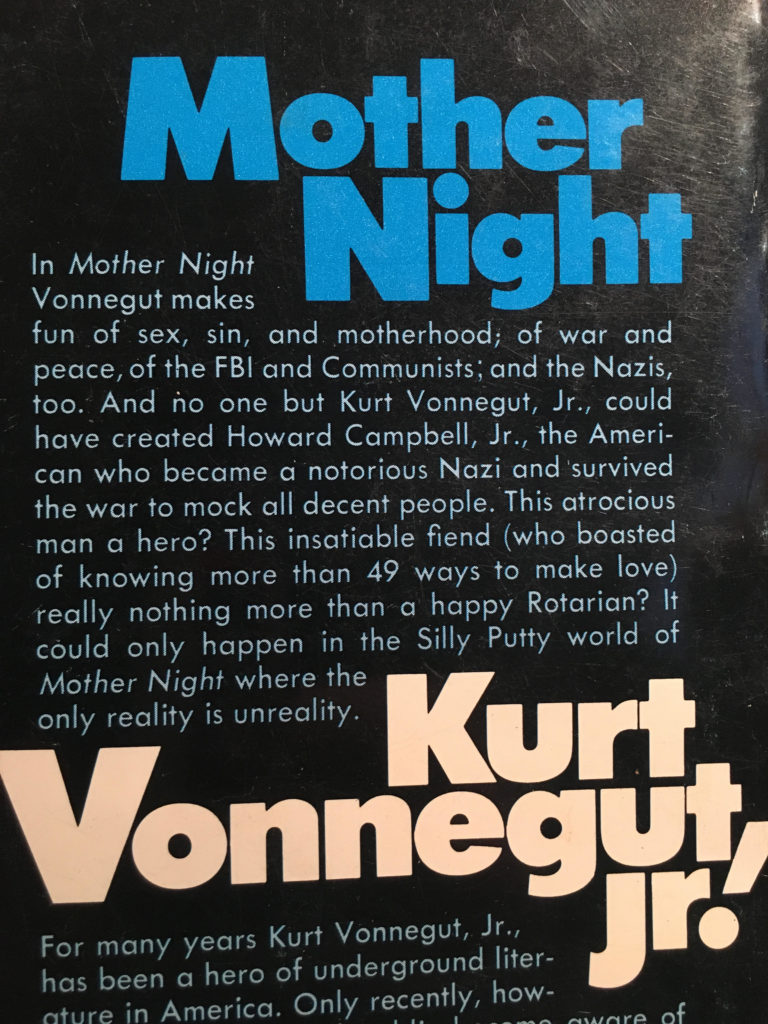 Strikes me that the reason a lot of novels start out so slowly is that they don’t take into account the version of the catalog copy on their back cover. That copy nearly always gives away the central conceit or trick or surprise of the novel, but the novel, pretending to itself that it exists as pages only, no marketing involved, plays its central whatever close to the vest for eighty or a hundred pages, taking the reader up an agonizingly slow incline to the first of its twists or reveals or big developments. Except the reader, because of that back cover copy that got them to buy the novel in the first place, they’re not reading in a “wait, what’s going to happen here?”-mode but a “when’s what I read about on the back cover going to happen”-mode.
Strikes me that the reason a lot of novels start out so slowly is that they don’t take into account the version of the catalog copy on their back cover. That copy nearly always gives away the central conceit or trick or surprise of the novel, but the novel, pretending to itself that it exists as pages only, no marketing involved, plays its central whatever close to the vest for eighty or a hundred pages, taking the reader up an agonizingly slow incline to the first of its twists or reveals or big developments. Except the reader, because of that back cover copy that got them to buy the novel in the first place, they’re not reading in a “wait, what’s going to happen here?”-mode but a “when’s what I read about on the back cover going to happen”-mode.
At least I know I do.
I’m not meaning to impugn the content on that back cover, either. The book’s first job is to move off the shelf, and that teasy pre-synopsis’s job is to move it, so it’s going to give away all it can, as it should, spoilers or no. And, really, as we all probably know, any story you can ruin by divulging its key twist, then it’s probably a gimmick of a story anyway.
No, what I’m getting at, it’s that too many novels put their story on delay while they world-build and introduce characters and establish setting and tone and all that necessary stuff. And I act like I’m talking about ‘them’ and not myself, but I’m just as guilty of this. I try to get better, to start faster, to hit the ground running, but then there’s voices in the back of my head whispering about how the reader’s not going to recognize the spikes and dips in the narrative if you don’t first establish the base elevation, whispering about how the first ten percent of any story is getting to know the character and world before the intrusion of whatever catalyst or coincidence that’s going to change everything.
But we all need to do better. One of the most important lessons I’ve learned about writing fiction lately, it’s in that Tom Petty documentary. In it he’s up in the studio, futzing and futzing with the arrangement of some iconic song, and what he’s mumbling to himself (as I remember it) is that it’s got to get to the chorus faster.
That’s the job of stories and novels, these days. Of the writers of those stories and novels. Back when, sure, we were allowed a long slow slope ‘up’ to the story. But not anymore. And I don’t mean to suggest that ridiculous trick—patch, more like—of someone somewhere in the process recognizing that this novel’s starting out slow, and then, to compensate/disguise, ‘advancing’ some hooky action-etc scene from deeper in the story, which the story will eventually catch up to, after slogging through this long, interminable opening. And I’m not talking about what Eco said about the first hundred pages of The Name of the Rose, that yeah, sure, it is a slog, no denying that. But—again, I paraphrase from memory—”those first hundred pages are the fire the reader has to walk through,” to get to the ‘reward’ of the rest of the story. Which, that novel, yeah, it needs to map out the monastery, establishing the 13th or 14th or whatever century it is. I understand that. But still, right?
The way to come at it, I think, it’s, first, to not play coy with what’s already on the back cover, and, second, to always picture a reader standing at a shelf in a store, scanning the first few pages of your novel. Yes, of course, the first line has to hook, the same as the title, the same as the cover (and the cover’s not yours, so don’t worry about that). But just because you’ve dreamed up something catchy and permanent for a first line, don’t think that buys you license to gear down and grind into a lot of boring stuff for forty or fifty pages.
In today’s market, you get no boring pages. Any story that’s ribbing you with its elbow, telling you to hang on, it gets better later, promise, that story’s going back on the shelf. As it should.
So: don’t have all the interesting and cool parts of your story happening in the last third. Plant some cool stuff early on, too. If you don’t, nobody’ll have any reason to push through to all the amazing stuff you’ve got planned.
And, this is a reminder to me as much as a call for things to improve generally. I can’t change every book on the shelf, but I can, hopefully, at least change the ones I’m typing in.


 is the NYT bestselling author of 35 or so books, +350 stories, some comic books, and all this stuff here. He lives in Boulder, Colorado, and has a few broken-down old trucks, one PhD, and way too many boots. More
is the NYT bestselling author of 35 or so books, +350 stories, some comic books, and all this stuff here. He lives in Boulder, Colorado, and has a few broken-down old trucks, one PhD, and way too many boots. More